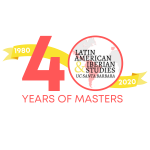Thelma Patnett is LAIS M.A. Alumna (2018), she is now pursuing a doctoral degree in cultural anthropology at the University of California, Riverside.
What led you to pursue an MA in LAIS?
As an undergraduate at UCSB I met Dr. Emiko Saldivar Tanaka in Anthropology during my last quarter of my senior year. She encouraged me to look at LAIS as a potential MA program to further develop my interests in the history of social movements in Latin America. As I pursued it further I realized that I had the ability to work with different professors from different disciplines to shape my research and received amazing support from professors in Anthropology, Sociology, and History.
Tell us a little bit about your research, and how your MA project came to be.
My research focus on feminism and collective action stems from the lived experience of my mother, during the Sandinista Revolution in Nicaragua. As a result my mother’s exit from Nicaragua deeply influenced my interest in examining the relationship between women and revolutionary movements.
In my MA research I specifically looked at the political consciousness of revolutionary women. I explored the revolutionary consciousness of Afro Nicaraguan women from their own perspective and placed it against the lack of representation of Afro descendents in the historical data.
Despite the dismissal of their revolutionary experience narratives of black women serve to challenge the hegemonic mestiza narrative and exemplify the role race and gender play in the historical memory of social movements. I showed that Afro Nicaraguan women were in fact revolutionary participants of the Sandinista movement and argued that memory and narratives had the capacity to produce alternative historical visibility. Focusing on Afro Nicaraguan women’s memory instead of the prevailing over representation of the feminist revolutionary mestiza reveals a different perspective of the Sandinista revolution as told by Afro Nicaraguan women of the Atlantic coast as they experienced it.
What’s next in your career path? Has your MA had any influence?
Currently I am a second year PhD student in Anthropology. Stemming from the MA research in Nicaragua, I am developing preliminary research that focuses on the imagined humanity of women and the act of survival within spaces of physical and bodily containment. More distinctly, it is centered on the multiple forms of survival that multi-ethnic women of Nicaragua implement to exist within and against systems of oppression and violence.
Do you have any advice for current LAIS MA students?
I would encourage students to engage with professors that will provide support and guidance on developing their research topics and methodology.
Anything else you’d like to share with us?
I send my warmest regards to the LAIS department, staff, and affiliated faculty. Without their support and constant encouragement I would have never dreamt to be this far in my academic career. Thank you

